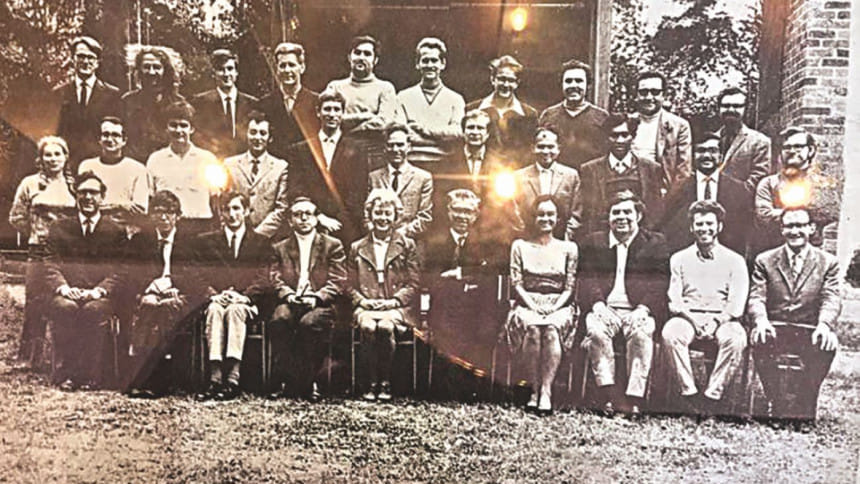Remembering Professor Jamal Nazrul Islam

March 16, 2018 marked the fifth death anniversary of Professor Jamal Nazrul Islam. I know everyone is still mourning Professor Stephen Hawking, but Professor JNI was also a larger-than-life figure. It is unfortunate that many people in Bangladesh don't know about him. In my mind, Hawking's greatest achievement was helping fund and create the Centre for Mathematical Sciences (CMS)—the largest mathematics department in the world. Professor JNI did something similar, although he didn't receive the acclaim and support that Hawking received. He established a centre, the Research Center for Mathematical and Physical Sciences (RCMPS), the only such centre in all of Bangladesh. This is an incredible achievement, a nation-building achievement.
People always measure the success of scientists by, for example, what discoveries they have made or what prizes they have won. But discovering something incredible is a haphazard process. You have to be smart. But more importantly, you have to be very lucky. I always think of Sidney Coleman in this context. He was a giant, an unparalleled expert on quantum field theory. He wrote incredibly important papers. Yet, he is not widely remembered because he is not credited with a "great discovery." The same goes for giants like Tom Kibble, who in fact co-discovered the Higgs Mechanism, but was not widely credited for it, and is thus largely unknown to the wider population.
But the real measure of a scientist's success is what institutions they leave behind, and the students they have produced. Professor JNI, in that respect, is as large a personality as any in Asia, or elsewhere. His centre predated Cambridge's Centre for Mathematical Sciences by 15 years. Cambridge's centre, several years later, inspired the establishment of the African Institute for Mathematical Science (AIMS) by another one of JNI's Cambridge friends and Hawking protégés, Dr Neil Turok. AIMS is doing revolutionary work to create mathematical expertise in Africa, and in a way, both AIMS and Cambridge's CMS can be said to have been inspired by Professor JNI's vision of nation-building through mathematical sciences. It is unfortunate that JNI's own visionary institution, RCMPS, is being underutilised, while the centres it fathered and grandfathered, CMS in Cambridge and AIMS in South Africa, are creating change throughout the rest of the world.
Nevertheless, JNI's influence can still be felt everywhere in academia. I myself would not have applied to Cambridge were it not for him. There are many others he trained and whose lives he touched and who are now guiding later generations of students. The people who we touch academically are, therefore, also the products of Professor Jamal Nazrul Islam.
Let me add one story about the benefits of being in Professor JNI's shadow. In 1995, my younger brother, Mahfuz Majumdar, was doing a science project for the Westinghouse Talent Search Competition despite going to school in Bangladesh. His project was an application of special relativity. He went to the Physics Department at the University of Dhaka to ask a professor some questions. The professor was very dismissive and even rude when my brother asked whether he could borrow a copy of the famous relativity book Gravitation by Misner, Wheeler and Thorne. The professor told my brother that he was a fool for even thinking about reading such an advanced book. Thereafter, my brother contacted Professor JNI about his project. JNI enthusiastically invited him to visit his research centre despite Mahfuz being only a 17-years-old.
My father, brother and I then drove to Chittagong from Dhaka. Professor JNI spent nearly two hours with Mahfuz and was very kind to him. Then he surprisingly invited us to his home. Professor JNI had a huge library of books on physics and mathematics. I remember standing in awe of his collection for several minutes. He asked me whether I would like to borrow any books. My eyes grew wide. It was obvious I did. I then picked out a book and asked him whether I could borrow it. After another five minutes, I picked out another book and asked him whether I could borrow that one too. This went on until I had asked to borrow about 20 books, and he happily agreed every time.
One thing that everybody knows about Bangladeshi students is that they never return borrowed books. So, in the end I was just shocked by his kindness. I returned his books several weeks later after photocopying every single one of them. But instead of taking them to Chittagong, his daughter Sadaf so kindly agreed to carry them—a huge bag of books—on a flight from Dhaka to Chittagong. Who else in Bangladesh would let a total stranger borrow a huge bag of books and then let that person burden his daughter with carrying them on a plane flight back?
The one thing I remember most vividly from that trip to visit Professor JNI in 1995 is what my father said after meeting him—"a superior human being." That's what my father called him. I had never heard my father, Dr Badiul Alam Majumdar, call someone a "superior human being" before then. And I have never heard him call anybody that since then.
Dr Mahbub Majumdar is Professor, Department of Computer Science & Engineering, BRAC University, and National Coach, Bangladesh Mathematical Olympiad.





Comments